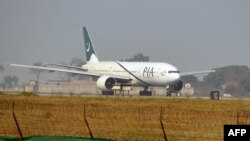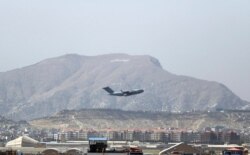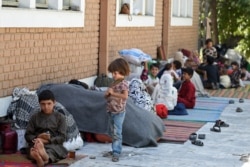The World Health Organization says an aircraft provided by Pakistan Monday delivered the first shipment of much-needed medicine and health supplies to Afghanistan since the country came under control of the Taliban.
The humanitarian assistance was loaded in Dubai and flown directly to the northern Afghan city of Mazar-e-Sharif, said a WHO statement. The supplies will be immediately delivered to 40 health facilities in 29 provinces across Afghanistan.
The Taliban marched into Kabul on August 15 after their weeklong stunning battlefield advances overran 33 of the country’s 34 provinces without facing any significant resistance from security forces of the ousted Afghan government.
The WHO said Monday that a reliable humanitarian air bridge is urgently required to scale up the collective humanitarian effort.
“After days of non-stop work to find a solution, I am very pleased to say that we have now been able to partially replenish stocks of health facilities in Afghanistan and ensure that — for now – WHO-supported health services can continue,” said Dr. Ahmed Al Mandhari, WHO regional director for the eastern Mediterranean.
The 12.5 metric ton supplies delivered consist of trauma kits and interagency emergency health kits, and are enough to cover the basic health needs of more than 200,000 people, as well as provide 3,500 surgical procedures and treat 6,500 trauma patients.
The WHO noted that Monday’s flight was the first of three planned with Pakistan International Airlines (PIA) to fill urgent shortages in medicine and medical supplies in Afghanistan.
Al-Mandhari thanked the Pakistani government for its efforts to support the WHO and the people of Afghanistan.
“Humanitarian agencies such as WHO have faced enormous challenges in sending life-saving supplies to Afghanistan in recent weeks due to security and logistics constraints. The support of the Pakistani people has been timely and life-saving,” he added.
The security crisis stemming from the Taliban takeover of Afghanistan and ensuing efforts by the U.S.-led Western nations to evacuate their personnel along with Afghan allies through the beleaguered Kabul airport had disrupted crucial humanitarian supplies into the conflict-torn country.
The WHO called for the world to remain focused on meeting the needs of the people of Afghanistan at this critical time.
“The world’s attention over the past two weeks has been focused on the air evacuation from Kabul airport. But the demanding humanitarian work of meeting the needs of tens of millions of vulnerable Afghans who remain in the country is now beginning,” the world body said.
On Sunday, UNICEF said in a statement that children were particularly bearing the brunt of the increased conflict and insecurity in the past weeks. The agency noted that children are “at greater risk than ever” in the wake of a security crisis, skyrocketing food prices, a severe drought, the spread of the coronavirus, and upcoming harsh winter conditions.
“If the current trend continues, UNICEF predicts that one million children under 5 in Afghanistan will suffer from severe acute malnutrition — a life-threatening disease.”
More than 4 million children, including 2.2 million girls, are out of school while around 300,000 children have been forced out of their homes due to the conflict, according to UNICEF.
The agency warned partners against cutting aid to Afghanistan. “The needs of the children of Afghanistan have never been greater. We cannot abandon them now.”







